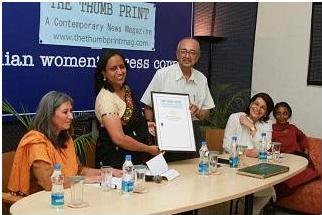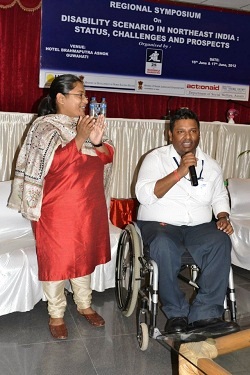He had gone to bed quite late the previous night and had immediately fallen asleep. In the small hours of the morning, a strange, sharp noise woke him up and made him sit bolt upright on the bed, Groggy with sleep, he rubbed his eyes and looked around in the semidarkness of his bedroom. There it was, a black cat on the window sill, silhouetted against the faint light outside, with its glowing eyes fixed on him. As he sat transfixed the feline creature made a shrill sound, jumped off the window sill and disappeared into the darkness. He could not remember having ever seen it before anywhere around his bungalow.
By now he was wide awake. He switched on the reading lamp on the bedside table and peered at his watch. It was three forty-two. He tried to get back to sleep, but in vain. He could not banish the thought of those glowing eyes fixed on him. Was it a premonition of an impending danger? He couldn't say for sure, although his rational mind was not prepared to accept such an absurd thought.
With the first light of dawn, Jagdish Bezbaruah, senior manager, Moran tea estate, got up from his bed and started getting ready for the day. He consulted his diary; it was Thursday, June 21, 2001. He had an important meeting early that afternoon and, hence, would have to finish off with his daily rounds to his out-divisions early.
So after a quick breakfast, he drove off in his jeep. By the time he completed his visit to Moran, Tikorai and Pathalipam division, it was 11.30. He was yet to visit Sivasagar division and was already late. He went to the factory to discuss certain things relating to manufacturing with Bikon Deka, factory assistant manager, when Sasanka Baruah, the garden assistant, arrived there to report that plucking of green leaf was in progress and everything was under control in the Sivasagar division.
Sivasagar is the smallest division of Moran tea estate, alongside the national highway, and is just opposite the Moran Polo Club. The division has two entry points, one near Khatkati bazar and the other in front of the Moran Polo Club.
Although the senior manager visits the division everyday, since everything was reportedly going on smoothly, and since he was already late for the meeting, Bazbaruah decided to skip Sivasagar that day. He returned to the bungalow for a shower and a quick bite. He had hardly started eating when the telephone began to ring. He ignored it initially, but the persistent ringing forced him to get up and pick up the phone. It was Deka from the factory.
"Yes, what is it Bikon?"
"Something quite serious, it seems," Deka sounded alarmed. "The line chowkidar of Sivasagar has just come running to me to report that there was a shootout going on inside the club. The sirdar supervising plucking near Moran Polo Club has also come with a similar report."
Bezbaruah had a hurried consultation with the factory assistant and asked him to send someone responsible to find out what the actual matter was and also to inform the local police immediately. As president, he initially thought of rushing to the club. But after considering all pros and cons, decided to wait till the arrival of the police. He sent for all the managerial staff to take stock of the situation. In the meantime, the garden clerk, who was weighing green leaf in a section just opposite the club, also arrived and reported that he had seen the happenings in the club premises from a distance.
Some cars had been arriving in the club right from nine in the morning. He first thought it was the monthly circle meeting of the garden managers. But when later on he heard the shooting, he was quite unnerved. He saw some people get into their cars and hurriedly leave the club following the shootout. And then all was quiet.
Notwithstanding the occasional heated exchanges between workers and management of tea gardens sometimes even leading to a minor crisis, if at any time the managerial staff, particularly the patriach - the burra saheb - is perceived to be in danger, the workers would give their lives to ensure his safety. So when the pluckers of the Sivasagar division, all women, heard the shootout, they threw their plucking baskets and proceeded to gherao the club thinking that their manager might have been hurt. However, the sensible staff members present there dissuaded them from taking such a dangerous step.
The police and paramilitary forces arrived and the club field was swarmed with khaki-clad security personnel and curious onlookers. Nobody, however, was allowed inside the club. Senior police officials present there, some of whom knew Bezbaruah, allowed him to go in. What he saw inside was beyond his wildest imagination. It was worse than what he had ever seen in a war movie. Dead bodies and human flesh lay strewn all over the place and the tiled floors were covered with fresh blood, broken glass-panes, splinters of ceramic tiles from the toilets and the cement plaster from the walls and the ceiling. The place wore a ghastly look. The dreams of 12 healthy youths had been cruelly cut short and their corpses lay all over the floor in gruesome postures.
The sight was so revolting that he could not stand and quickly came out. Does anyone have the right to take a life, Bezbaruah asked himself. But he knew that it was useless asking such questions.
But who were these young people? Why had they come to the club? It was a private club of tea planters and no outsider had any authority to use the club. As club president, he had no information whatsoever of these boys assembling there that morning. He shuddered to think what could have happened had the incident taken place on the day of a circle meeting when all the managers assembled or in the afternoon when ladies and children generally assembled for a swim or for other forms of recreation. In any case, the club would not be the same again, he thought. The hellish incident would leave everyone unnerved.
Soon afterwards, police investigations started. Senior police official arrived from Guwahati. As usual, the club authorities had to answer a lot of queries. The president and secretary of the club were asked why they gave permission to the boys to hold their meeting in the club. It was only then that the club authorities learnt that the "boys" were none other than surrendered militants and the shootout was, in all probability, an outcome of inter-faction rivalry.
But the club president and secretary had a difficult time convincing the investigating officials that nobody in his right mind would have given permission to hold such meetings, and in any case, the "boy" never bothered to ask for one. Besides, this being a roadside club, it was kept open for the use of visiting planters and their families and it was difficult to check things all the time.
The planters, however, are made of different mettle. Undaunted by the horrendous happenings in the club premises, they decided to accept the situation stoically. Quite a bit of money had to be spent for doing up the place although a number of bullet holes from the Kalashnikovs of the assailants still show prominently on the walls and elsewhere as grim reminder of the scourge of our times.
The club was formally declared open on July 22, 2001, just one month after the incident, not with fanfare, but by holding all-religion prayers and a purifying yagna. As a measure of precaution, the backyard of the club building was walled and the front entrance grilled. Certain restrictions were imposed regarding entry into the club and the club hours.
It is interesting that after a full year of the unprecedented incident, which sent shock waves through the planters' community in Upper Assam, the identity of the assailants has not been fully established and new theories keep emerging by every passing day. But the incident has left a deep scar in the minds of the planters and their families.
The Moran Polo Club ground, which once used to buzz with action as polo players astride their thoroughbreds played their chukkas uttering the usual expletives, to the great delight of the onlookers, had fallen silent a long time ago. But other sporting activities in the club have also declined considerably during the past year. Fear is now the key. The club is certainly not going to be the same again.
Find us on facebook: facebook.com/TheThumbPrintMag







































